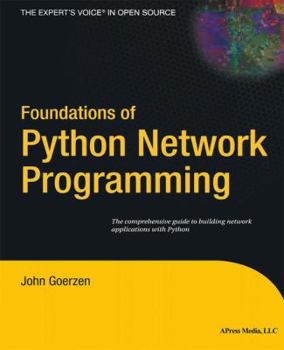Foundations of Python Network Programming (Foundations)
Select Format
Select Condition 
Book Overview
Customer Reviews
Rated 5 starsSuperb
Clearly written with tons of practical examples. Mr. Goerzen has a very deep understanding of internet protocols, network programming, and the Python libraries. If you are ever going to use Python to send or receive emails, write web servers, or anything else you can think of that has to do with internet, you should not hesitate to buy this book, far and away the best Python network/internet book on the market.
0Report
Rated 5 starsThis is an Essential Python Book
For the time-crunched, in-need-of-a-quick-fix reader: This is an excellent, much-needed book. If you want to do network programming with Python or, for that matter, any scripting language (as many of the concepts here are basic, essential, and adaptable) buy this book and be happy. With clear code examples, concise text, and insightful attention to the needs of the target audience -- practical programmers in need of a quick...
0Report
Rated 5 starsA review by an accidental reader - the lucky one :-)
This title accidentally popped up while I was searching for some book covering web programming in Python; bookmarked the link and went on with my quest. Later on, I found what I was looking for (Python Web programming by New Riders) and decided to go back and glimpsed over the table of contents of the book that I'm reviewing now, "Foundations of Python Network Programming". Wow, what a surprise, I was really impressed by...
0Report
Rated 5 starsGreat book, highly recommended
As a networking consultant I have a good deal of experience with networking programs and protocols. I have also programmed in Python to meet some basic needs for processing web site input. If you want to move several steps beyond basic Python programming into the realm of network programming you will find this book one of the best resources available today. The coverage of networking with Python is very thorough and includes...
0Report
Rated 5 starsClient and server on a range of protocols
The great thing about this book is that it shows both the client and server, in a high-level language (Python), of a variety of different protocols. In this way you learn about the architecture of the protocols, as well as how to use Python to implement them. The book covers XML-RPC, IMAP, HTTP, FTP, among others. It also includes information on high performance web server python through mod_python. The book is very focused...
0Report












